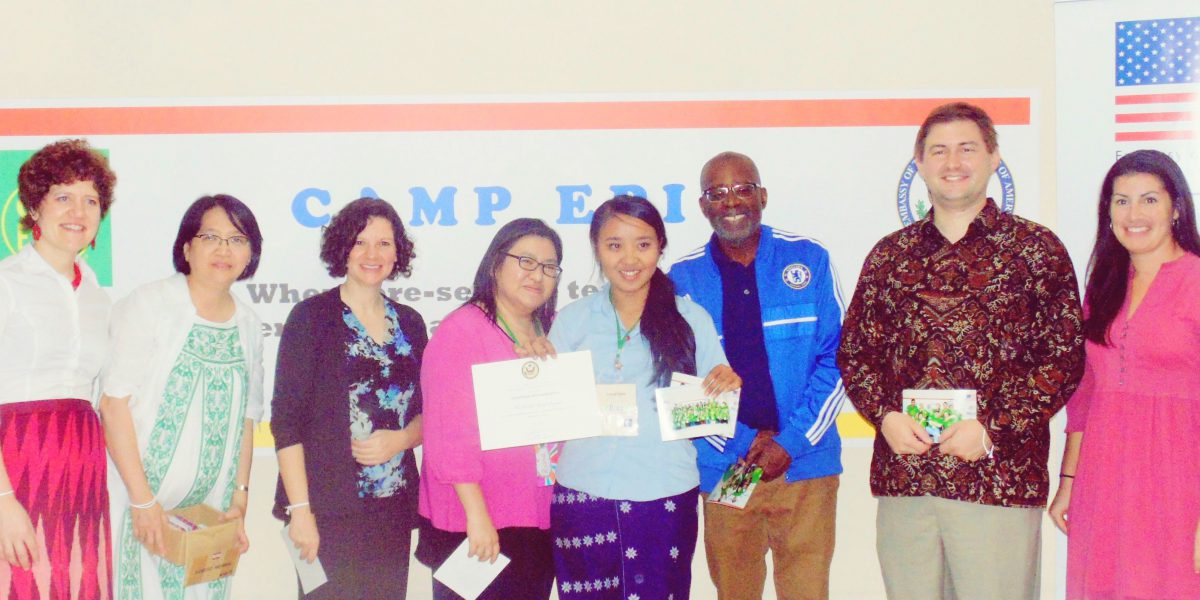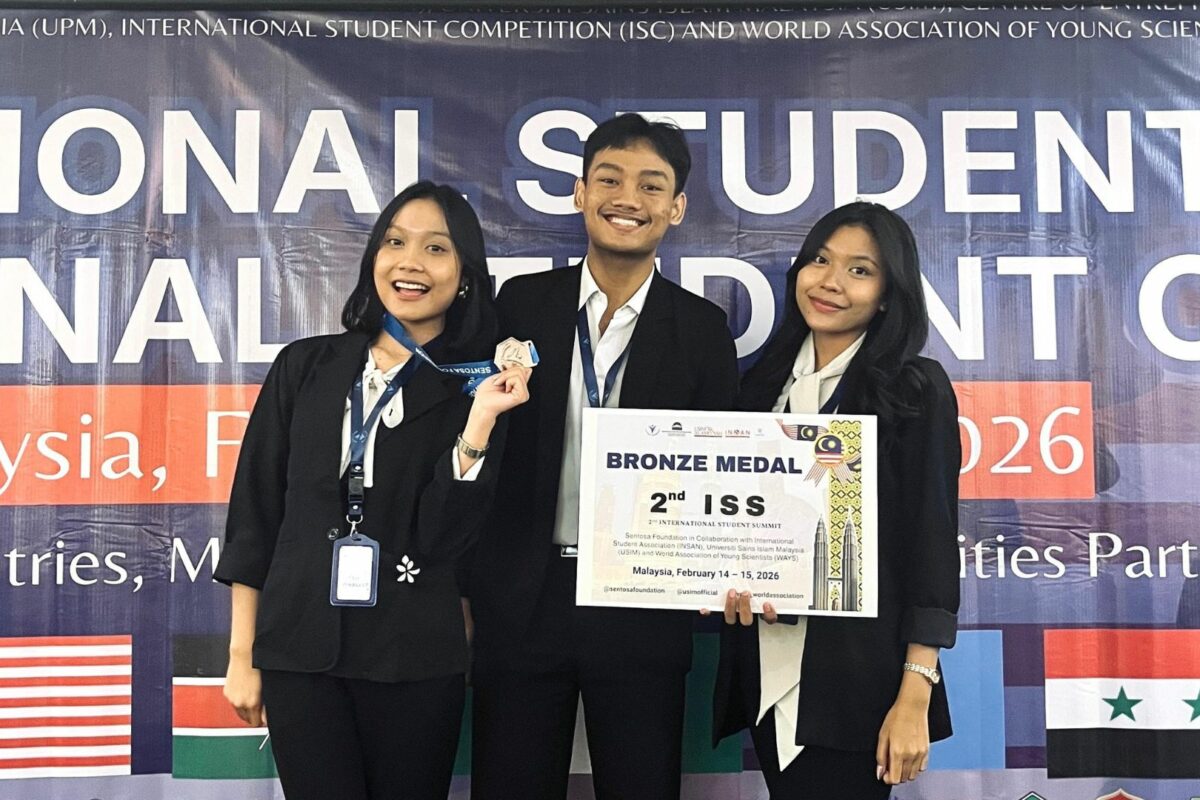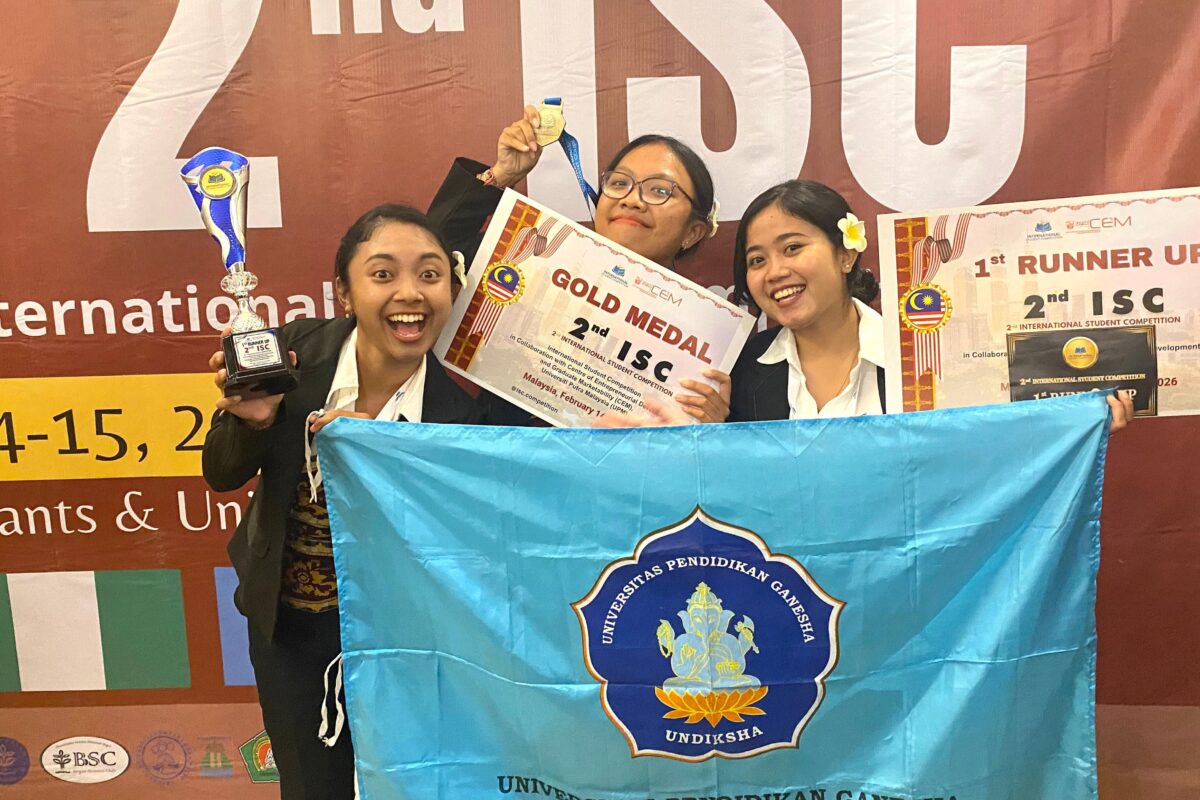“If you obey all the rules, you miss all the fun.” – Katharine Hepburn, American notable actress.
A young trainee teacher loves to have fun but also easily questions his dream all the time. When dark days such as working on lesson plan and grading students’ assignment come approaching, he will naively assume that the dream teaching career will not last forever. Just imagine, suppose you are a young confident English trainee teacher with an eagerness to experiment new strategy in your micro teaching. You are always proud of your English pedagogy. In short, you always have a great time to teach your friends in micro teaching simulation. At the same time, you also maintain a great passion for culture, and awareness toward your students’ problems. However, when you enter the real class during your teaching practice at school, the daily routine of teaching the same material over and over begins to degrade the enthusiasm that was once so promising earlier. As you recognize your own error little by little day by day, they belittle your passion which was once so exceptional days earlier. So, what is your decision?
In Indonesia, many pre-service teachers face the same challenge and goal. No doubt Regional English Language Office (RELO) of US Embassy for Indonesia and Timor L’este held a Pre-Service Teacher Camp (EPIC Camp) in June 1-13. The program took place at Graha Guest House Ciumbuleuit, Bandung, West Java. Their prior orient was on shaping powerful mental preparation for future English teacher of Indonesia. Assisted by University of Indonesia (UI), all mentors (English fellows) were native speakers from USA. With only 10% of acceptance rate, there were 22 participants (young trainee teachers) from all around Indonesia and Timor L’este. In fact, all participants were assigned in several leadership missions. Since leading a classroom was one of the biggest challenges, leadership training was also powered by intensive lesson planning. Of course, the lesson planning was inspired by the English fellow’s modelling in the classroom at first. Therefore, all the participants and English fellows would stay connected to each other across the archipelago and the world. So, by the end of the camp, all participants were expected to be Empowered, Prepared, Inspired and Connected (EPIC).
Scaffold and do not assume!
The first question all participants had was “what is scaffolding?” Since the first modelling by Samar Aal and Bryan Holzer in teaching listening class, the term scaffolding had been underlined several times. Even, few days before the camp was begun, Christy Lewis (the camp director) had raised a question about scaffolding in an online survey for the camp. The result revealed that almost all participants admitted to know the word. However, the first teaching modelling had raised more questions about it. So, every teaching practice was inspired by scaffolding.
Scaffolding is literally platforms or boards which are joined together to make a structure for workers to stand on when they are working on building construction. Just as the literal meaning, scaffolding plays the same role in language teaching. Scaffold means giving instruction starting from the easiest part into the hardest part. As Christy Lewis said, “scaffold and give instruction little by little.” She emphasized that mostly students feel hard to follow a long instruction. A teacher should construct her instruction into several pieces sorted by the simplest level into the most complex level. According to Kinsey Wethers Durham who is in charge of teaching writing, asking the students to repeat the instruction will help to check their understanding. She will ask the students, “Okay. What is the first thing you need to do? The second? And then? What is the thing you need to do after that?….” It is more manageable rather than replying student’s question one by one. Therefore, it is better to give instruction step by step rather than explaining all activities at once.
Using prediction is the first thing to consider in implementing scaffolding. Instead of explaining all the materials at once in the beginning of the lesson, it is better to elicit information from the students’ prior knowledge. Samar Aal noted that the successful key of giving instruction was making the students learn in context. In other words, they do not realize that they are studying. Meanwhile, we also have to do a need analysis at the beginning. It would help us to understand what they know, what they want to know and what they learn. In that case, the teacher should embody communicative language to gather information from the students and introduce another new vocabulary along the process without assuming their understanding too much.
The term “assume” was first proposed by Bryan Holzer, one of the English fellow who taught Teaching Listening in the camp. During the listening skill micro teaching, most of the participants tend to assume that their students would always understand all the instructions that they gave in the class. For instance, we always neglected lesson planning. We did not organize it like the appropriate lesson plan template. There was no back-up plan in our plan to anticipate the condition if we had an excessive remaining time allotment, or lack of time. We failed to transfer an instruction and consequently unable to catch students’ attention. To restart would be difficult because students had already lost us. Therefore, once there was a blank state in the middle of the instruction, students’ mind would be puzzled. As a result, Bryan Holzer always reminded us, “do not assume!” While Christy Lewis also added, “do not forget to prepare a lesson plan because a lesson plan supports teacher’s confidence in directing the class.”
Low Technology Lesson Planning, Creativity and Integrated Skill
Using technology is an effective alternative for teaching English in the recent era. However, the lack of facilities in most schools could not support the implementation effectively. According to the need analysis conducted by the English fellows at the beginning of the camp, all participants agreed to the fact that most of schools could not provide usable electronic supports. Sometimes for a 90 minutes English class, to prepare an LCD spends so much time. Moreover, if the facility is not settled up in an appropriate order. Just for setting the device and starting the engine might take 20 minutes which is equal to 20% of the full classroom activity. We might lose one activity if we cannot solve the problem. Besides, it tends to cause an ineffective long chaos in the class.
Considering the technology failure, EPIC camp reinforced low technology activity. In particular, the emphasis is very much on using board and modelling. We believe that boarding all the points will help the low proficiency students to follow the lesson. Just like multiple intelligence theory, students need more exposure than only listening to teacher’s speaking. Especially during a classroom activity such as expressing surprise or amazement, while practicing the expression in pair, they could look at the board every time they forget about the terms.
The maximization of the media also goes hand in had with the integration of language skills. In the teaching listening modelling, the emphasis was not about listening to digital audio but helping the students to feel the sense of communicating in English. One example demonstrated by Samar Aal and Bryan Holzer was about describing picture activity. Students worked in pair and sat facing each other. One person would be a listener and the other one would be a speaker. The speaker sat in front of the listener while also facing the board. Meanwhile, the listener could not glance at the board. Then, the speaker had to describe the picture posted on the board (for example: a map of a house). In the other hand, the listener listened to the speaker’s description and draw a picture. So, speaking skill and listening skill were integrated in the activity. However, if the teacher want to modify it into more like writing activity, the listener can write the description without drawing it. As a result, there is no isolated skill.
Once again, every lesson plan depends on the teacher’s creativity. Fabio Coelho demonstrated how a board game could be adapted for young learners into advanced learners. If the objective is about self introduction, the teacher could modify each instruction on the board into “What’s your name?, What’s your hobby, What’s your favorite food?….” After the students roll the dice, they have to answer the question and speak. If the teacher want to focus more into writing skill, she can ask the student to write the answer instead of say it out loud. If the teacher want to assess listening skill, teacher can provide a fun rubric for peer assessment. Student can assess their friend’s answer by putting a star in each component of the rubric after their partners speaking. For those explanations, the point is to make every student involves in the class. To conclude, teacher needs to be creative, manageable and flexible in order to reach the objectives.
Noisy Sticky Notes on the Wall
Reflection time was always full of fun. Every night, we colored a puzzle piece and wrote everything that they had learned on it. Done coloring, we stuck the puzzle piece on the wall. In the end of the camp, it would be completed. Another way to reflect was based on the questions posted on the wall. For example, there were four major questions posted on the wall. We needed to work in group and stood in each post. For instance, the question told us to write the thing that we still felt uncomfortable with. Then, the English fellow asked us to switch into another post and answer another question until everyone answered all the questions. As a result, we kept moving in the class and also did a reflection at the same time.
Another part of reflection was expression of gratitude. In our wall, there was one post entitled “Kudos to”. The term “kudos” functioned the same as the word “thank you”. We could stick a small sticky note to express our feeling to other people. For example, someone would write “Kudos to Sultan for teaching us step dancing today” or it can be “Kudos to the chef for cooking a delicious gado-gado this morning.” So, everyone was free to express their mind and feeling. Based on those examples, reflection was just a matter of how fun we could conduct it rather than asking the students to sit and answer a questionnaire.
No Brain Activity and Shake the Lesson Plan Off!
We usually had No Brain Activity after completing one micro teaching practice and thesis writing class. All participants and the English fellows were free to choose an activity. Mostly, we played card game such as Uno, and Apple to Apple. Some people also loved to learn about cutting and creating paper decoration for teaching media. I think it was after the Dorm Door Decorating Competition, everybody started to love coloring and making paper decoration. The other option was karaoke in the classroom or going out. However, No Brain Activity started after 8.30 p.m. so everyone preferred to stay in the camp.
Once in two days, we also had American Moment and Outdoor Activity. The English fellows would share their experiences about American culture or their personal life. There were several topics during the American Moment, such as American Wedding, history of American Affrican, blended family in America, quotes of American leading figures, and studying in America. For outdoor activities, we had play some sports and games such as Photo Scavenger Hunt in Cihampelas Walk, Dodgeball, Kickball, Ultimate Ball, Red Rover, Bob the Weasel and Yoga work-out.
During opening in the morning and Shake it Off time (another kind of opening after lunch), we always had songs and games. All songs and games were already provided by the camp director but to lead the activity, it was participants’ duty. It was also a part of leadership assignment, so every participant had a chance to lead the whole class. All songs were followed by several unique movement and they were all useful both for young learners and adult learners. They were Bazooka Bubblegum, Black Socks, If You Are Happy, Boom Chika Boom, Bingo, Down by the Bay, Hi My Name is Joe, Everywhere We Go, Hokey Pokey, Peel Bananas, Row Row Row Your Boat, Old McDonald, Wheels on the Bus, She’ll be Coming around the Mountain, Singing in the Rain, With You in My Vessel and Make New Friend. Meanwhile, the games were Fruit Basket, Electricity, Word Race, Bang (Camp Epic), Line-Ups, Gorilla-Man-Cage, Relay Pictionary, Singing Bee, Ball Relays, Wink Game, Human Machine, I Have Never, Rhythm Snap, Birdie on a Perch, Ring the Bell, Conversation Game, Camera-Action-Shoot and Murder Mystery Dinner. All those songs and games were applicable in the class as long as there is enough space for running and moving.
EPIC TIME! EPIC END!
There was a special cap called Epic Time cap in the camp. At first, I thought it was only an accessory but it had a great role in the class. Every time the English fellow wore the cap and held Epic Time poster, it indicated that they were explaining an important thing such as the why-factor. For example, after completing a teaching modelling, they would wear Epic Time cap and explained why they used the strategy and the reasons of conducting each activity. It was a good classroom management to attract students’ attention and focus. It is beneficial for giving a confirmation in the class, thereby the class finished in an epic end.
After two weeks, pre-service teacher camp also came to an epic finish. Jennifer Uhler, the Regional English Language Officer, congratulated all participants for their passionate participation, English fellows for the attention and modelling, UI team for their supports, and all universities and lecturers for preparing such knowledgeable and ready students. After the closing was over, Asirah, one participant from Aceh, commented, ”I found a new family here and met inspiring people from all over Indonesia and also awesome American fellows who taught me so much that teaching is not about you, it’s about your student.” In the other side, as an English fellow, Sean Ryan said that he needed the camp as much as the students. It helped him remember why he started teaching in the first place. As a result, we create a powerful network across the archipelago and world that will enable us to support each other. Our creativity, sensitivity, passion and pedagogy will contribute prominently to refine our practice. So, we can still obey all the rules and have fun at the same time because our rule tells us to have fun in a joyful learning environment. (Ni Kadek Heny Sayukti)
Photo Gallery:





